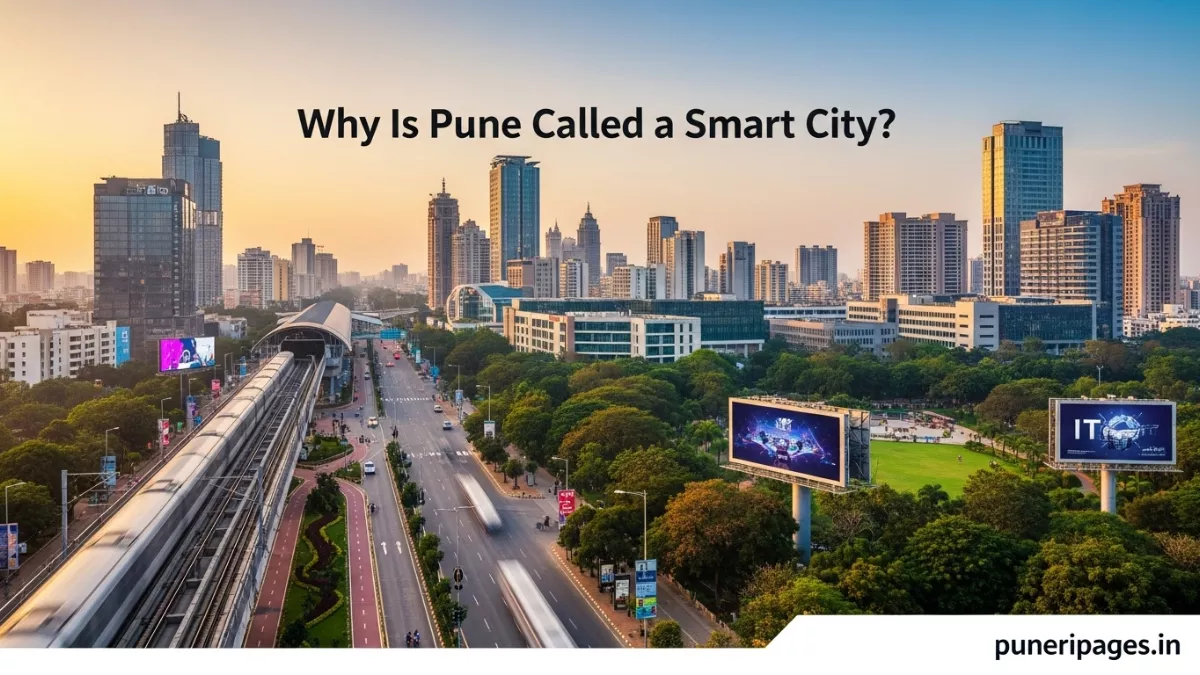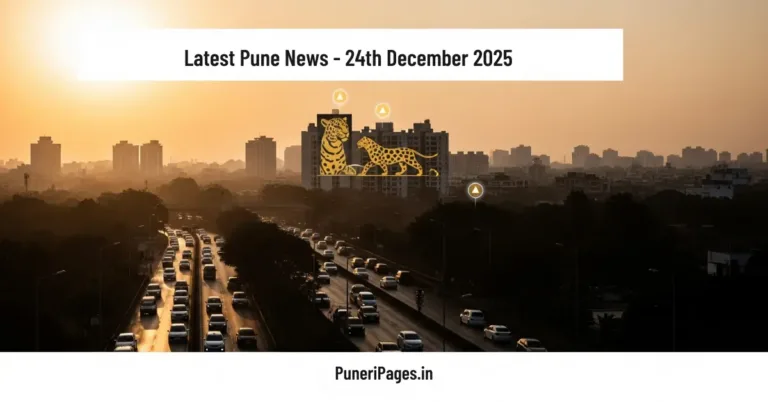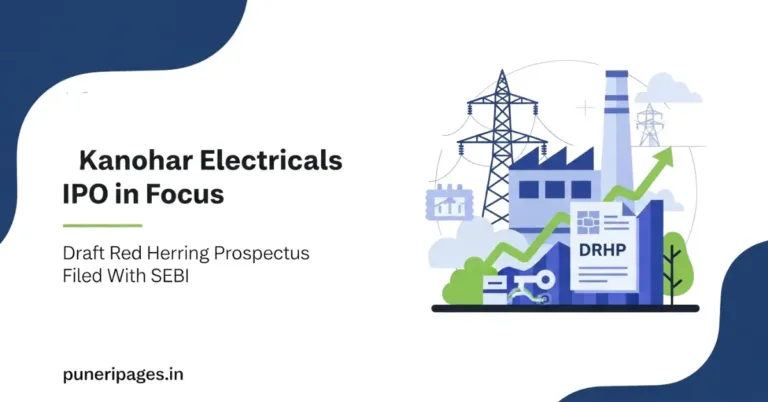
Pune’s journey to becoming a Smart City — blending technology, sustainability, and citizen innovation. (Image: puneripages.in)
By Prashant for PuneriPages.in
Pune, often known as the Oxford of the East, has transformed from a historical and cultural hub into one of India’s leading smart cities. But what truly makes Pune a smart city? The answer lies in a combination of visionary governance, cutting-edge technology, efficient urban planning, and an unwavering focus on sustainable development.
In this article, we explore the key elements that earned Pune its title as one of India’s most progressive and livable smart cities.
Table of Contents
1. Pune’s Vision: Transforming into a Smart Urban Ecosystem
The foundation of Pune’s smart city journey began under the Government of India’s Smart Cities Mission (SCM) launched in 2015. Pune was among the first 20 cities selected in the initial round — a testament to its readiness and strong administrative framework.
The city’s vision was clear: to enhance quality of life, drive economic growth, and ensure environmental sustainability through intelligent use of technology and community participation.
The Pune Smart City Development Corporation Limited (PSCDCL) was established as the implementing agency to drive this transformation — blending governance, innovation, and citizen engagement into a seamless framework.
2. Citizen-Centric Governance and E-Governance Initiatives
What truly differentiates Pune from many other cities is its citizen-first approach. Digital governance has played a key role in making Pune smarter.
- Pune Connect App: A one-stop mobile application that enables citizens to pay utility bills, register grievances, track public transport, and access municipal services instantly.
- Open Data Portal: Promotes transparency by allowing public access to real-time data on urban services such as traffic, air quality, and waste management.
- Online Civic Services: From property tax payments to building permissions, Pune Municipal Corporation (PMC) has digitized over 80% of its citizen services.
By embracing e-governance, Pune has created a model of accountability and accessibility that other Indian cities aspire to replicate.
3. Smart Infrastructure and Urban Mobility
Pune’s infrastructure transformation is one of the cornerstones of its smart city evolution. The city has adopted modern, data-driven systems to manage transportation and reduce congestion.
Intelligent Transport System (ITS)
The ITS initiative integrates GPS, AI, and IoT technologies to monitor public buses, manage traffic signals, and improve road safety. Citizens can access real-time bus tracking through apps like PMPML Mobile App, ensuring reliability and convenience.
Smart Streets and Pedestrian Zones
Pune has implemented “Smart Streets” designed for all — pedestrians, cyclists, and vehicles. Features like sensor-based street lighting, smart signages, and Wi-Fi zones enhance both safety and aesthetics.
Non-Motorized Transport (NMT)
Encouraging eco-friendly travel, Pune has developed over 100 km of cycle tracks and dedicated walking pathways. The city’s bike-sharing initiative, Pune Cycle Plan, promotes sustainable last-mile connectivity.
4. Sustainable Urban Development and Green Initiatives
Pune’s approach to development is deeply rooted in sustainability. The city focuses on reducing pollution, conserving resources, and creating green spaces.
- Smart Water Management: Pune employs real-time monitoring of water distribution networks, reducing water wastage by up to 30%.
- Waste Segregation at Source: Over 60% of households in Pune actively practice waste segregation, supported by an efficient door-to-door collection system.
- Solar Power Integration: Pune’s municipal buildings and streetlights are increasingly powered by solar energy, with ongoing projects targeting 100% renewable energy adoption in specific zones.
- Urban Green Cover: Initiatives like “Green Pune” aim to increase tree plantations, rooftop gardens, and eco-parks, promoting biodiversity within urban limits.
Sustainability isn’t just a goal in Pune — it’s a continuous commitment woven into the fabric of city planning.
5. Smart City Projects Driving Innovation
Under the Smart Cities Mission, Pune has launched numerous flagship projects that integrate innovation with daily life:
- Command and Control Center (CCC): The nerve center of Pune’s smart governance — this facility monitors traffic, waste collection, water supply, and emergency response in real time.
- Public Wi-Fi Zones: Over 200 hotspots across the city provide free, high-speed internet access to residents and visitors.
- Smart Parking System: Digital parking management ensures optimal use of space and reduces congestion in high-density areas.
- Safety and Surveillance: AI-powered CCTV cameras enhance public safety and assist in effective law enforcement.
These projects not only simplify life for citizens but also position Pune as a technology-driven, future-ready metropolis.
6. Education and Innovation: The Backbone of Smart Pune
Home to prestigious institutions like Savitribai Phule Pune University, Symbiosis International University, and Fergusson College, Pune’s academic ecosystem nurtures innovation.
The city’s vibrant startup culture and research-driven universities make it a hub for technological advancement. Many smart solutions — from traffic analytics to environmental monitoring — are developed in collaboration with local startups and academic institutions.
This strong intellectual foundation contributes to Pune’s continuous evolution as a knowledge-based smart city.
7. Economic Growth and IT Integration
Pune has emerged as one of India’s top IT and manufacturing hubs, second only to Bengaluru in technological influence.
The presence of global companies like Infosys, TCS, Wipro, and Tech Mahindra, along with emerging IT parks like Hinjewadi and Magarpatta, has propelled Pune into a dynamic economic zone.
Through its Smart City framework, Pune has integrated IT systems into urban planning — from GIS mapping of infrastructure to predictive analytics for urban utilities.
The result is a seamless blend of economic strength and digital intelligence.
8. Community Engagement and Inclusivity
A defining feature of Pune’s smart city success is its emphasis on community involvement. Initiatives like “Mazi Smart Pune” (My Smart Pune) encourage citizens to contribute ideas and participate in development projects.
From designing smart streets to participating in waste management drives, residents play an active role in shaping their city.
Moreover, the city’s policies ensure inclusivity — with special programs for senior citizens, differently-abled individuals, and economically weaker sections — making Pune not only smart but also humane.
9. Future of Pune: Road Ahead for the Smart City Vision
Pune continues to evolve with an ambitious roadmap for Smart City 2.0, focusing on:
- AI-driven predictive infrastructure maintenance
- Expansion of solar-powered public utilities
- 5G-based real-time traffic management
- Zero-waste neighborhoods
- Climate-resilient urban planning
The goal is to make Pune a global benchmark for sustainable, technology-integrated urban living.
Conclusion
Pune’s transformation into a smart city is not a mere technological upgrade — it’s a holistic evolution that combines innovation, sustainability, and community participation. From digital governance and intelligent transport systems to eco-friendly initiatives and citizen engagement, Pune represents the future of urban living in India.
The journey continues, and as Pune grows smarter, it also grows greener, fairer, and more connected than ever before.






